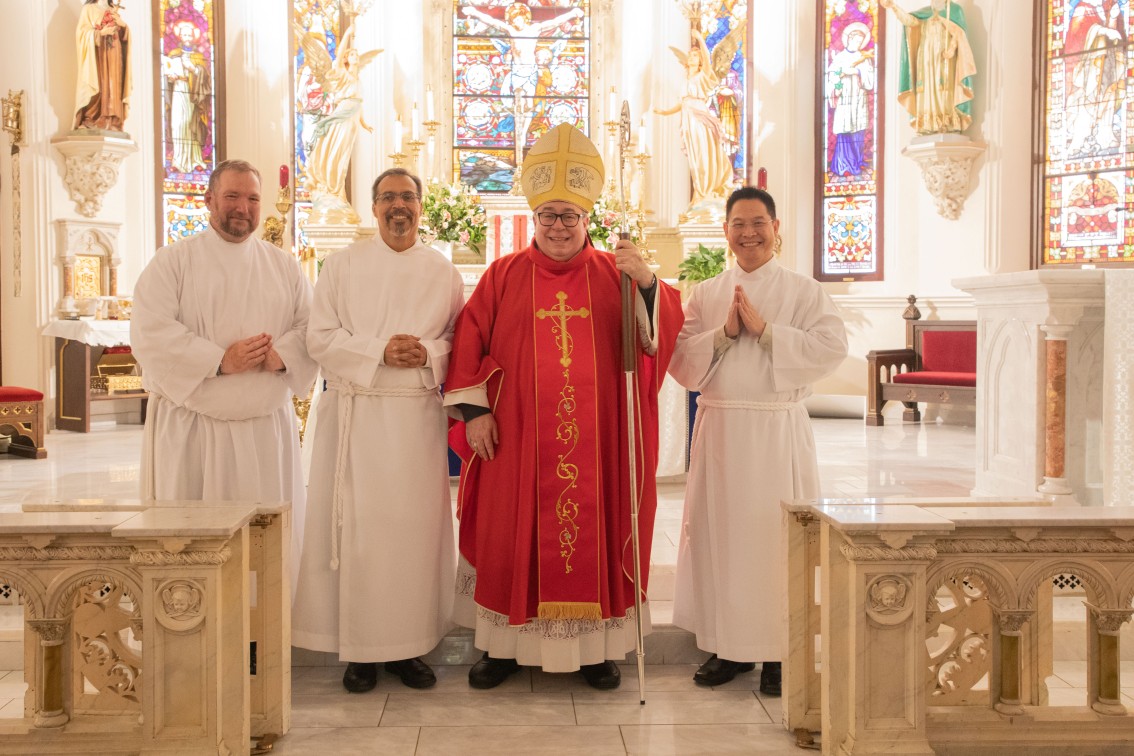Homily for the Memorial of Saint Charles Lwanga and Companions and Martyrs
Profession of Faith for Diaconal Candidates
June 3, 2024
Saint Patrick Cathedral
Fort Worth, Texas
2 Maccabees 7:1-2, 9-14
Psalm 91:1-2, 14-15b, 15c-16
Matthew 5:1-12a
When I entered seminary in August of 1980, I was introduced to the Latin language in Latin 101. During those four years of high school, I came to learn Latin prose, Latin syntax, and Latin poetry. Among the poems I learned, the English translation of one still stands out in my mind:
Latin is a dead language
Dead as dead can be
It killed the ancient Romans,
Now it’s killing me.
Among the principles of syntax, I learned included something called indirect discourse. Indirect discourse blurs the line between quotation and narration. It is a way of saying something without actually being man enough to own what you say. It was used in Imperial Rome to appease the Emperor but to be noncommittal enough as to not get ahead of the Emperor — to prevent the Emperor from taking a head — namely your head.
Indirect discourse became a device used also in literature, not only in Latin but in other languages. Indirect discourse, however, does not exist in the language of Christ’s Gospel. As the Apostle James reminds us, “But above all, my brothers, do not swear, either by heaven or by earth or with any other oath, but let your ‘Yes’ mean ‘Yes’ and your ‘No’ mean ‘No,’ that you may not incur condemnation.”
The Maccabee brothers spoke directly and boldly with great fortitude in witnessing to the holiness of the first Covenant with their words and their lives: “We are ready to die rather than transgress the laws of our ancestors.”
Jesus spoke directly in today’s Gospel and people responded with faith. He clearly taught the Beatitudes that set a clear path for the Christian life filled with joys and responsibilities. Jesus culminates His Sermon on the Mount with the final beatitudes: “Blessed are they who are persecuted for the sake of righteousness, for theirs is the Kingdom of heaven. Blessed are you when they insult you and persecute you and utter every kind of evil against you falsely because of me. Rejoice and be glad, for your reward will be great in heaven.” Jesus did not use indirect discourse.
Neither did Saint Charles Lwanga use indirect discourse. Charles Lwanga preached the Gospel with an eye towards heaven and bravely saved young men from the homosexual predation of the evil King Mwanga set forth within a hierarchical system based on power and exploitation. This direct discourse cost him his life and not just his political career in this world but won for him and his companions the great reward in heaven.
Evil is not straightforward even if it cajoles us to misuse things that are good in themselves. Evil is cunning. Evil is seductive. Evil plays with ambiguity and partial truths. Evil uses indirect discourse. King Mwanga seduced vulnerable young men to give them a place at court; they were attracted because it made them feel important and gave them power. It helped their families financially. It was the cost of getting ahead and having a part in power that is the currency of any regal court. The chiefs subordinate to the King used indirect discourse to save their own positions. Saint Charles Lwanga told them the truth directly and saved them from a death-dealing fate even as they gave their lives in holiness as martyrs.
The ministry of deacons must involve the use of direct discourse in preaching the Gospel of Jesus Christ within His hierarchy based on unconditional love and service. The least of this world are the most important. The Church’s requirement that our candidates make a profession of faith before ordination is precisely that they speak directly about the truth of the contents of the Catholic Faith and their commitment to it as the revealed and authentic Gospel of Christ.
Faith is not a private or religious experience, a personal preference, nor a subjective assumption. There is a public dimension of faith that sacramentally involves all the members of the Church. An act and profession of faith entails making a claim that impinges upon reality, humanity and morality, with social consequences and an eye towards eternal life. The profession of faith is a matter of integrity, otherwise we become Gnostics professing secrecy instead of the Faith. We become activists and not disciples or ministers of Christ. Professing the truth of the faith is “not forgetting” all of the truth revealed fully in and by Christ. As you profess your faith in preparation for your ordination as deacons for service in the Church, ask God for the Grace to always eschew indirect discourse and to embrace the directness of Christ’s revelation that rests at the heart of the nature of the hierarchy of the Church that places the weakest and poorest among us as first in the Kingdom of God.

